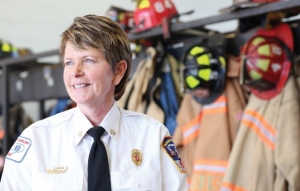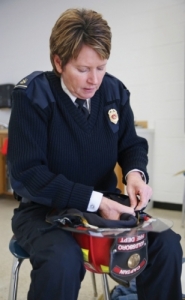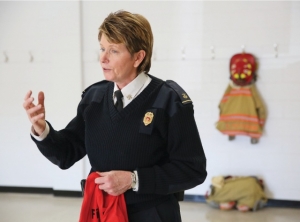Making it count
By John Joyce
Published in News on February 22, 2015 1:50 AM

News-Argus/CASEY MOZINGO
Assistant Fire Chief Lisa Johnson poses for a photo at the Goldsboro Fire Department. Johnson was recently named North Carolina Firefighter of the Year.

Lisa Johnson prepares retired Capt. Bernard Patterson's equipment so that he can use it for training in the new Goldsboro High School Fire Academy, which he will be leading.

News-Argus/MELISSA KEY
Assistant Chief Lisa Johnson speaks about her support for the new Goldsboro High School Fire Academy in the classroom where the program is held.
She would rather you hold your applause.
Being in the spotlight isn't really her thing.
But despite her modesty, Goldsboro Fire Department Assistant Chief Lisa Johnson is quite accomplished.
This June, Goldsboro's second-ever female firefighter -- and wife, mother, cancer survivor, former farrier and present mentor to the city's future leaders -- will add another moniker to her list of titles.
North Carolina State Firefighter of the Year.
But the award, a community service honor obtained for Johnson by a local American Legion outfit, was only one of two major surprises the top training officer for the fire department received last year.
The other -- one that came while she was sitting in the doctor's office -- was "like a sucker punch."
Lisa was in for a battle.
Her kidney cancer diagnosis turned up during a routine physical, when blood was discovered in her urine.
"It was like a sucker punch," she said. "I didn't ever expect it to happen to me."
And when the doctors told her she had been suffering from the disease at least 10 years, she was shocked.
Luckily, the slow-growing cancer was still detected early enough to allow doctors to cut the diseased portion of tissue out with little fanfare.
At least that's the way Lisa tells it.
"I don't like to say I battled cancer," she said. "I was very thankful. I had surgery and I was a little bit sore after it, but it is nothing compared to what other people have gone through."
There would be no chemotherapy -- no radiation treatments.
"That is not always the case for other people," she said. "There are a lot of people who truly battle, so I hate to say I battled it."
In fact, the woman some might call a trailblazer says she has had to battle very little in her life.
She looks back on the time she spent on the Goldsboro Volunteer Rescue Squad in the 1980s and her subsequent transition into the fire service as a natural progression and one that was embraced by her fellow first-responders.
She said that in many ways, her time in ROTC during her high school years in Charlotte prepared her for the future she did not then know she would embark on.
But that would come later, after years spent developing her first love -- working with horses.
*
Lisa grew up in Charlotte, where she attended South Mecklenburg High School. She had three older brothers and a love for the outdoors.
Where Johnson struggled, however, was in the classroom -- with common classes like English.
But she quickly found a place where she could thrive -- one where she would develop the tools that would prepare her to not only overcome her own difficulties with learning later in life, but also become an educator herself.
"I was involved in ROTC. I was the drill team commander. That impacted my life and really helped me in my career today," she said. "I learned command structure, responsibility and leadership."
She also learned a thing or two about horses.
And that love would ultimately bring her to Wayne County -- to the fire service to which she has dedicated 30 years.
"I had an instructor who had horses," she said. "His family helped me out and I showed horses with him and his family. I went to a farrier school in Virginia and I became a farrier. And that is how I came to Wayne County."
A farrier, she explained, is someone who shoes horses.
"The word blacksmith, that really pertains to a person who can shoe horses but can also work the iron, make their own shoes. I never did make my own shoes. I was a farrier," Lisa said. "I always loved being outside, worked with my hands. I didn't want, at that time being that young, to sit behind a desk."
And she didn't.
Wayne County offered a more rural setting where Johnson could nurture her trade. But it was through working other jobs on the side that she found her true calling.
"I got connected with some people here who helped me. I had some relatives here. I did several jobs. I worked in a grocery store, and while I was working there, I had an opportunity to meet different ones who were on the volunteer fire department," she said.
It was through those connections that Johnson got interested in volunteer rescue work. And in 1983, at 22 years old, she joined the force.
"I joined the Volunteer Rescue Squad-Goldsboro in '83 and I served there 12 years. That just kind of made the next step to get on the fire department here," she said.
Although it was a different time back then and the fire service is traditionally a brotherhood, Johnson said she never encountered any sexism or obstacles one often hears about when it comes to females entering a male-dominated career field.
"The men that I worked with, if there was a problem, I wasn't aware of it. The first lieutenant I had, Billy Daughtrey, was like a great father figure. They treated me with respect. If there was a problem with me, I didn't know it," she said. "I never felt that they didn't want me here. I've never felt that. That might not be the same in other fire departments, but when I came up during that time it was a big family. I've got three brothers, so when I started coming up through here it was like they were all my big brothers."
That was, and remains, the atmosphere.
"For me, it was just a great opportunity," she said. "I did my best to pull my weight and work just as hard as they did."
*
Johnson still prefers to be out from behind her desk, but rather than be in the barn shoeing horses she has given much of her time in recent years to the classroom.
She works with Goldsboro teens to offer them a glimpse -- and an opportunity -- similar to the one she got in ROTC.
The Goldsboro Fire Explorers are a group of 12- to 18-year-olds who train with, drill with, and sometimes travel to competitions with real firefighters. It is like the ROTC for the fire service, Johnson explained.
Johnson heads the program along with other firefighters who volunteer their time to show children in the community what the career is all about.
"So the thing with the ROTC, I didn't have a direction. I didn't know about college opportunities or what I wanted to do," she said.
And that is exactly what she tells her students.
"(I tell them), 'I cannot promise you a job, but I can promise you direction in your job.' And that is my role to them," Lisa said. "I promise them direction."
Johnson never joined the military, but ROTC helped her. So she knows that some of her students may never go into the fire service or EMS, but the explorer program and a new vocational course offered at Goldsboro High School that begins this month might help them.
"I hope they do, but if they don't go into the fire service, I really feel like the program will still impact them in the same way," she said. "You put yourself out there, you had to take a risk. You competed against other teams and it is hard to do that."
She said a recent discussion with a student demonstrated just that.
"I have a student right now who is a little bit on the shy side. I said, 'Go out there and do this.' She said, 'Chief, I'm scared.' I said, 'What are you scared of?' She said, 'I'm afraid I won't do well,'" Lisa said. "So you're having to take a risk. So I look back and I can relate. You're stepping out there and you're having to take a risk. Because what if you don't win ... but you can't let that hold you back. So I remember what that was like. Sometimes we can feel what our teenage years were like."
*
Along with countless fond memories are some days Johnson will never forget.
Being diagnosed with cancer caught her off guard, but she was able to deal with it and had a positive outcome.
But for so many she sees in her line of work, the outcome is far less kind.
"People didn't expect to die. You don't expect it. Being in the fire service and rescue -- people didn't expect to be in a wreck that day -- and so it makes me have that awareness, this could be your day," she said.
In fact, one of her first calls as a firefighter had nothing to do with fire. It was a response she thought she was prepared for, she said.
"It was a shooting. My first thought was, 'Oh, they probably accidentally shot their foot. I'm going to go help them with that,'" Lisa said. "And that was not what happened."
A woman had attempted suicide.
"I walked in there and ... I had not expected that. It was a shock, and having to learn to work through those things ... going through that tells you that life, you can't take it for granted."
For Johnson, who happened into a career of service and sacrifice, what comes after is as important as what will eventually be left behind. And after a career spent training and preparing others to save lives and put safety first, her legacy is as much about faith as it is about the future generations of firefighters.
"A lot of people believe that we are born and we die and that nothing comes after," she said. "I believe, I have the strong hope, the expectation in God that there is more after death. Seeing death so often, it makes you think about not living in fear of it, but living in awareness of it. And I want my life to count. That is why I work with these kids."
